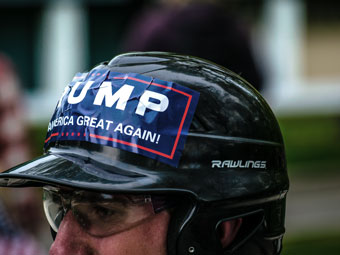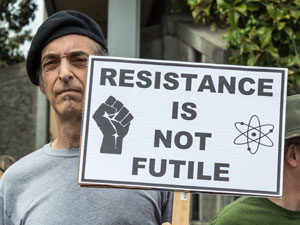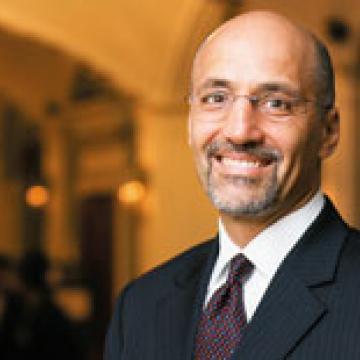From the Director: A tale of two Trumps
Yogi Berra once said, “You can observe a lot by watching.” You can also hear a lot by listening.
Since President Trump’s inauguration, I have traveled extensively—almost every week—bringing the Miller Center’s work on the lessons of presidential “first years” to a wide range of audiences across the United States, and even to a few foreign cities.
But I’ve also been listening. In my travels, I’ve had the pleasure to meet with both supporters and critics of Trump, hearing their concerns, their praise, their criticisms.
For a country—and world—living the same moments, seeing the same footage, the value of different perspectives cannot be overstated. Those perspectives clearly are filtered through a number of lenses—different media, but also discrete communities, economic viewpoints, and life experiences. My travels and conversations—from Los Angeles to London, from Dallas to New York, from Atlanta, Georgia, to Athens, Greece—have revealed that our current political climate, at its core, is a tale of two presidencies. And of two Trumps.
Trump’s supporters think he cannot get a fair shake. They relish his candor, continue to be angry at our broken political system, and believe the mainstream media to be biased. They do worry about his discipline, but are comforted to know that other presidents often get off to a rocky start.
Critics, on the other hand, believe our president to be a political miscreant who has crossed the line so far as to have broken the law. They want to know how and when this will all end.
I’ll start with his supporters.
THE SUPPORTERS

In Florida in February and March, I visited Florida’s southeast coast—from Miami to Palm Beach. They told me the president does not take kindly to failure, and therefore will self-correct if granted the time and space to prove himself once again as a comeback kid.
“Just look at his successes,” they said. “He has fielded a strong team.” Even the naysayers will concede he’s assembled a hall-of-fame-caliber group of foreign policy advisors.
In Chattanooga in late March, there was an appreciation for a president who can shake things up, even if there remained widespread concerns about his approach. “Bluster is part of his strategy,” they argued. He begins with an extreme position, in the hope that the negotiation adjusts back more than halfway of where it might have otherwise landed. Just read his 1987 book The Art of the Deal.
“The worst thing you can possibly do in a deal is seem desperate to make it,” Trump wrote in The Art of the Deal. “In other words, you have to convince the other guy it’s in his interest to make a deal.”
Where he has not succeeded, however, they tell me they find comfort in knowing other presidents have also stumbled. When this atypical president falters, it makes him seem that much more typical. And that, they say, is reassuring.
In Washington, DC, in April, Republican operatives were still focused on reaching out to the new team in town. At a panel discussion at the conservative Heritage Foundation think tank—even amid the upheaval and departure of their CEO Jim DeMint—there was celebration of Trump’s accomplishments, including the appointment of Neil Gorsuch to the Supreme Court and the loosening of regulations by way of executive order.
In Charlottesville, Virginia, at a panel discussion in April with Senator Mark Warner (D-Va.) and the New York Times’ Peter Baker, there was acknowledgment of the president’s total dominance of the media landscape. After all, viewership ratings and exposure are the yardstick against which Trump measures his success. On the day of that event, Trump was mentioned in every article on the front page of the New York Times. That same day 30 years prior, in that same paper, President Reagan was mentioned in just one.
In New Orleans and Dallas in May, there was a real sense that, absent a unifying event or crisis, we’re destined to remain a divided nation. “People get what they are willing to tolerate,” they told me.
And in New Jersey, earlier this month, just a few miles from Trump’s famed golf course in Bedminster, I spoke with a childhood friend of mine who has worked with Trump and who supported his campaign. He continues to feel great sympathy for the president’s message. “We are, after all, a sovereign country,” he told me. “At some point, we have to claim what is ours, and say that that is our priority.” But he also says that he has stopped defending the president: “The total lack of discipline makes it hard for me to say anything positive anymore.”
Across the pond in London in early May, Brexit sympathizers held firm that populism should and will reverberate across the globe. For them, Trump’s election was simply a reaction to the state of fractured power in the United States. Given Trump’s roots in entertainment, ratings, not majorities, have become populists’ go-to measure of success.
Still, even for Trump’s supporters, there is such a thing as too much. “If we can just get him to stop tweeting,” they said to me. “Does he have the discipline to dial it back?” On a scale of 1 to 10, he seems most often drawn to 11.
And in Tennessee, even for a native-son conservative elected official such as Senator Bob Corker, Trump’s style and politics have been making people uneasy. “Don’t listen to what he says,” Corker told our breakfast group. “Watch what he does.” Corker praised the president for nominating and confirming a “Boy Scout” in Justice Neil Gorsuch. But he also raised concerns about the lack of discipline shown by the president and the White House, and the administration’s highly questionable sympathy for Russia’s political leaders. He also wondered aloud about a White House staff that is part traditional Republican, part New York Democratic, and part radical populist. Beneath all of that lies a concern about the long-term impact of Trump’s unpredictable behavior on our very predictable governing institutions.
THE DETRACTORS

Then there were the anti-Trumpers, the Resisters. Throughout these past four months, I have tried to put the Trump presidency in the context of our broader political polarization. But the current environment goes well beyond anything I’ve experienced in my lifetime, crossing party lines.
In my regular trips to New York, the president’s hometown, I find that nearly everyone expresses a deep sense of worry and fear. Worry that his health care and tax plans do not make sense, and that the political establishment—especially moderate Republicans—would normalize Trump just enough to force these plans through. Some seemed hopeful that the more traditional influencers in the West Wing (i.e., Gary Cohn, Steve Mnuchin, Wilbur Ross) would infuse Trump’s agenda with some less-radical policy ideas. Others feared that these leading individuals would end up carrying the stigma of working for a president who is bound to fail.
At a summit on race at the Carter Library in Atlanta in late March, I found some willingness among African American leaders to engage in a dialogue with the new president, although there was a much deeper undercurrent of worry. For those in the Black Lives Matter movement, the fear is that Trump will use any dialogue to merely stage a photo-op.
The Resistance in DC and Charlottesville included thinkers on both the right and the left. Those on the right—Pete Wehner, John Negroponte, Eric Edelman, Saikrishna Prakash, Bill Kristol, Rich Lowry—questioned Trump’s transgressive personality, cited his temperament as ill-suited for the grave decisions a president often has to make, and firmly hewed to the notion that he is not a real conservative. On the left, Senator Warner said the congressional investigation of possible collusion with Russia is the single most important responsibility of his career.
In San Francisco in April, socially liberal but fiscally conservative business leaders worried that Trump’s approach to immigration would have a negative impact on innovation. Since he’s not an ideologue, though, others retain some hope that, as an outsider, he will eventually find some middle ground.
San Franciscans, as well as Angelenos, also wondered about the fortitude of our institutions: Can they survive a Trump presidency? And if those institutions hold firm, does that mean, almost by definition, that he is destined to be impeached?
In Dallas, a self-described conservative Republican businessman has lost faith in both Texas Senator Ted Cruz and Trump, and told me that he no longer knows how to describe his political philosophy. But with respect to what the country should do, he said, “We should focus on the financial hardships of the middle class; wealth distribution is out of whack.”
In London in May, Trump detractors voiced their concern about the ripple effect. After all, what happens in the United States shapes and influences what happens around the globe. With a close-up view of regimes elsewhere in the world, they think the United States looks frighteningly similar to African, Asian, and Latin dictatorships. If we disengage even more dramatically, they say, it will lead to the destruction of the US political center as a stabilizing force in global politics.
Even amidst Brexit, in a city where conservatives are relatively easy to find on economic and strategic security matters, Trump supporters were few and far between.
Earlier in the spring, I had travelled to Greece, the birthplace of democracy, where the same concerns were revealed: that a lack of US engagement will force Europe’s weakest link to fend for itself—the worst example of which would be the absence of a counterpoint to an aggressive and aggrieved Russia.
Nearly all of this travel was before the mid-May maelstrom: the firing of the FBI director, a questionable meeting with Russian dignitaries, and a steady drumbeat of new controversies. In New York and Washington, the feeling is that something very different has just happened—that suddenly, this has shifted from a fight-filled reality show to a return to criminal investigations and political warfare.
Yet even with all of that, one former Obama White House official, now living in New York City, offered sage perspective: “Trump is, in a sense, a wildly different version of Obama. He comes in outside the political system. His party doesn’t control him, and he doesn’t control them.” We are in a new world where our traditional order has been turned on its head. “And this all could go in any direction—from impeachment to reelection.”
One thing seems predictable: that this presidency will remain unpredictable. And that the country will continue to adjust and debate. Given the president’s ability to dominate the national political discourse—for good or bad—he is not likely to go away anytime soon. We have a forceful personality now holding an office that is at a political crossroads—with a Congress of his own party that is struggling to pass his agenda and an opposition that is feeling emboldened and assertive. That has led to a resurgence of political discussion—which, in turn, provides more opportunities to listen to what people are saying across the nation, and across the political spectrum.
